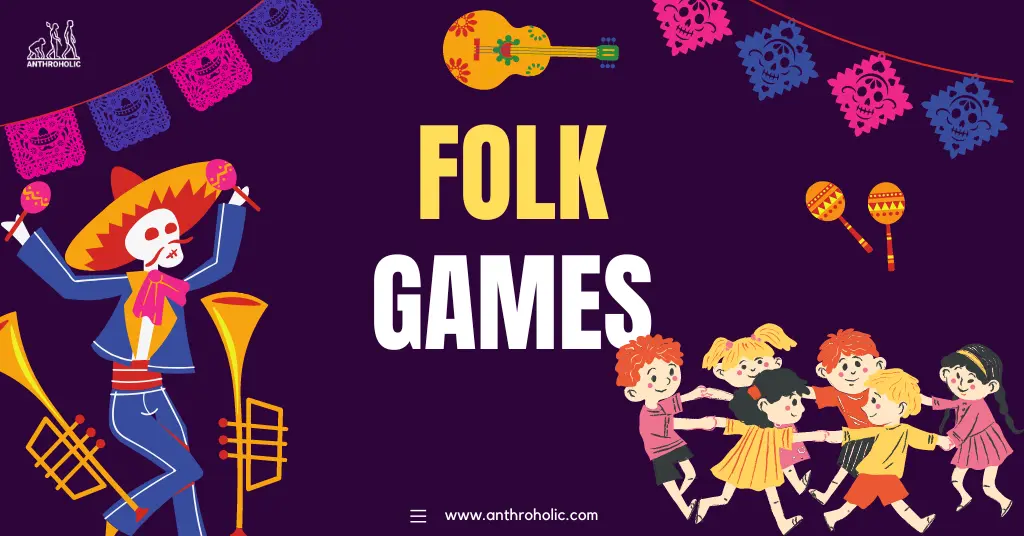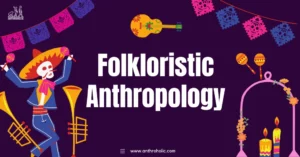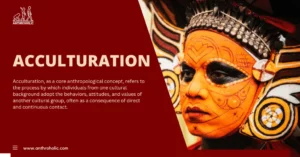AI Answer Evaluation Platform Live Now. Try Free Answer Evaluation Now
Folk Games
The importance of games in human cultures is often undervalued, but their role is deeply embedded in our social and cultural fabric. To understand the anthropological significance of the games, it is crucial to focus on three broad categories of games folk games, day-to-day games, and occasional games.

Folk Games: Cultural Narratives in Play
Folk games are traditional games that originated from different cultures and civilizations across the globe. They are usually passed down from generation to generation and are enriched with cultural narratives, historical significance, and traditional values.
- Origins and Evolution: Folk games have often been created from local resources and circumstances, evolved as a reflection of a group’s environmental interactions and cultural ethos [1]. For instance, ‘Hopscotch’, believed to originate from ancient Rome, was a military training exercise for Roman foot soldiers [2].
- Cultural Significance: Many folk games carry within them a rich tapestry of cultural narratives. For instance, ‘Mancala’, an ancient African game, is steeped in agricultural metaphors, reflecting the agrarian societies from which it emerged [3].
Table 1: Examples of Folk Games
| Game | Origin | Brief Description |
|---|---|---|
| Hopscotch | Roman Empire | A player tosses a small object into numbered spaces and hops through to retrieve it. |
| Mancala | Africa | A strategy game played with seeds or stones in rows of pits. |
Day-to-Day Games: The Everyday Social Construct
Day-to-day games are those that are regularly played in routine life. They are generally uncomplicated, often spontaneously played, and act as a societal bonding mechanism.
- Social Bonding: Day-to-day games play a crucial role in creating and maintaining social bonds. For example, card games or board games, like ‘Chess’ or ‘Go’, facilitate interaction and encourage cooperation, competition, and strategy [4].
- Developmental Impact: These games are also important in child development, enhancing cognitive abilities, motor skills, and social-emotional learning.
Table 2: Examples of Day-to-Day Games
| Game | Category | Brief Description |
|---|---|---|
| Chess | Board Game | Two-player strategy game played on a checkered gameboard. |
| Go | Board Game | Two-player abstract strategy game aiming to surround more territory than the opponent. |
Occasional Games: Festivity and Commemoration
Occasional games are typically played on specific occasions or events, such as festivals, rituals, or social gatherings, acting as a symbol of celebration and unity.
- Festivity and Ritual: Many societies feature games as part of festive rituals. For example, ‘Tug of War’ is played during ‘Onam’ in Kerala, India, symbolizing the communal harmony.
- Commemoration: These games also serve to commemorate historical events or cultural stories. In Japan, the ‘Kemari’ game played on New Year’s Day, is a remnant of the Heian period, fostering a sense of cultural continuity.
Table 3: Examples of Occasional Games
| Game | Occasion | Brief Description |
|---|---|---|
| Tug of War | Onam (India) | Two teams pull at opposite ends of a rope. |
| Kemari | New Year (Japan) | A game where players keep a ball in the air using any body part except arms and hands. |
Conclusion
Games, in their various forms, serve as microcosms of societies and cultures. Folk games carry cultural narratives, day-to-day games build social bonds and aid in personal development, while occasional games mark celebrations and historical commemorations. All these games not only entertain but also educate, preserve heritage, and strengthen community bonds.
References
[1] Huizinga, J. (1938). Homo Ludens. Routledge.
[2] Culin, S. (1907). Games of the North American Indians. Dover Publications.
[3] Russell, A. (2004). “The Cultural Significance of Mancala Games”. Games and Culture. 1(2):115-131.
[4] Sutton-Smith, B. (1997). The Ambiguity of Play. Harvard University Press.




